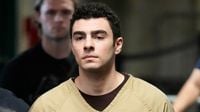The high-profile case of Luigi Mangione, the 27-year-old accused of fatally shooting UnitedHealthcare CEO Brian Thompson in December 2024, has brought the murky boundaries of terrorism law into the national spotlight. After months of legal wrangling in both New York and Pennsylvania, a recent decision by a New York judge has narrowed the scope of the charges Mangione faces, dismissing terrorism counts and focusing the case on homicide and weapons offenses. The ruling, along with ongoing legal battles over Mangione’s court appearances and the potential for federal capital punishment, underscores the complexities of prosecuting ideologically motivated violence in America.
On September 16, 2025, Justice Gregory Carro of the New York City Criminal Court dismissed two terrorism-related charges against Mangione. The decision came during Mangione’s first court appearance in five months, a hearing closely watched by legal analysts and the public alike. Carro’s ruling, as reported by Newsweek and CBS News, concluded that while there was sufficient evidence to support homicide charges—including second-degree murder—there was simply not enough to sustain the terrorism charges under New York state law.
"There is no indication that a murder committed for ideological reasons…fits within the definition of terrorism," Carro wrote, according to NBC News. He elaborated that terrorism statutes require a desire to terrorize the public, inspire widespread fear, engage in a broader campaign of violence, or conspire with organized terrorist groups. The judge’s decision echoed concerns raised by legal scholars about the dangers of stretching terrorism definitions to cover acts that, while horrific, do not meet the statutory requirements.
The case has its roots in the shocking events of December 2024, when Mangione allegedly shot and killed Brian Thompson outside a Manhattan hotel. Authorities quickly apprehended Mangione at a McDonald’s in Altoona, Pennsylvania, just days after the high-profile killing. The incident sent shockwaves through both the healthcare industry and the broader public, with many questioning Mangione’s motives and the appropriate legal response.
Prosecutors argued that Mangione’s actions were driven by perceived injustices in the U.S. healthcare system. In filings cited by the Associated Press and ABC News, they maintained that Mangione intended to "violently broadcast a social and political message to the public at large." Writings recovered from Mangione’s belongings prior to the shooting reportedly detailed his desire to bring attention to "everything wrong with our health system" and to negatively impact UnitedHealthcare financially. Prosecutors also alleged that Mangione sought to intimidate UnitedHealthcare employees and bring about revolutionary change in the healthcare industry.
Despite these arguments, Judge Carro was not convinced. He pointed out that New York’s terrorism statute—enacted just days after the September 11, 2001 attacks—was designed to combat acts intended to intimidate or coerce a civilian population, influence government policy, or affect government conduct through violence. Citing examples like the 9/11 attacks, the Oklahoma City bombing, and the World Trade Center bombing, Carro emphasized the statute’s original intent. "Here, the crime—the heinous, but targeted and discrete killing of one person—is very different from the examples of terrorism set forth in the statute," Carro wrote in his ruling, as reported by local media.
The judge also noted the "unique meaning" of terrorism, warning against trivializing the term by applying it too loosely. "The concept of terrorism has a 'unique meaning,' and its implications 'risk being trivialized if the terminology is applied loosely in situations that do not match our collective understanding of what constitutes a terrorist act,'" Carro wrote, referencing the New York Court of Appeals.
Had the terrorism charges stood, Mangione would have faced the possibility of first-degree murder charges, significantly increasing his sentencing exposure. As it stands, he remains charged with second-degree murder and eight weapons-related offenses under New York law. Conviction on these charges could result in a sentence of 25 years to life in prison.
The legal battles don’t end in New York. Mangione also faces a raft of state charges in Pennsylvania, including forgery and illegal weapons possession. On September 18, 2025, federal prosecutors denied a request for Mangione to appear in-person for his upcoming November hearing in Blair County, Pennsylvania, despite a local judge’s order. Mangione’s attorney, Thomas Dickey, has vowed to fight the decision, citing his client’s "constitutional right" to appear in person. Nevertheless, Mangione will be allowed to attend the hearing via video call. Blair County District Attorney Pete Weeks told WJAC News, "we remain prepared to move forward and defend the pretrial motion."
Perhaps most consequentially, Mangione faces federal charges that include two counts of stalking, one firearms offense, and murder through the use of a firearm. These federal charges make him eligible for the death penalty. U.S. Attorney General Pam Bondi has publicly encouraged prosecutors to pursue capital punishment, calling Thompson’s killing a "premeditated, cold-blooded assassination that shocked America." Proceedings in both the state and federal cases are set to resume on December 1, 2025.
The high-profile nature of the case has sparked broader debates about the use and limits of terrorism laws in the United States. Legal analysts, including Jonathan Hafetz of Seton Hall Law School, have praised Judge Carro’s decision as "well-reasoned," warning that broadly labeling violence as terrorism can be misused for political purposes and may have a chilling effect on free expression. As Hafetz told NBC News, "broadly labeling violence, even horrific violence as in this case, as terrorism can be misused for political purposes and have a chilling consequence on free expression."
This debate is not merely academic. In the aftermath of other politically motivated killings—such as the recent assassination of conservative commentator Charlie Kirk—public figures and media outlets have rushed to label such acts as terrorism, reflecting a trend toward using the term as a rhetorical weapon. Critics, like Reason’s Matthew Petti, argue that expanding the definition of terrorism does little to enhance public safety, as underlying crimes like murder and kidnapping are already illegal. Instead, it gives the state another lever of symbolic power.
For Mangione, the legal battle is far from over. His attorneys have argued that concurrent state and federal prosecutions could prejudice his right to a fair trial, but Judge Carro has called such claims "speculative" and declined to dismiss the state case. Mangione has pleaded not guilty to all charges.
As the case moves forward, it will continue to test the boundaries of terrorism law, the reach of federal and state prosecutions, and the nation’s understanding of how to respond to ideologically motivated violence. The outcome could shape not only Mangione’s fate, but also the legal landscape for future cases at the intersection of crime, politics, and ideology.


